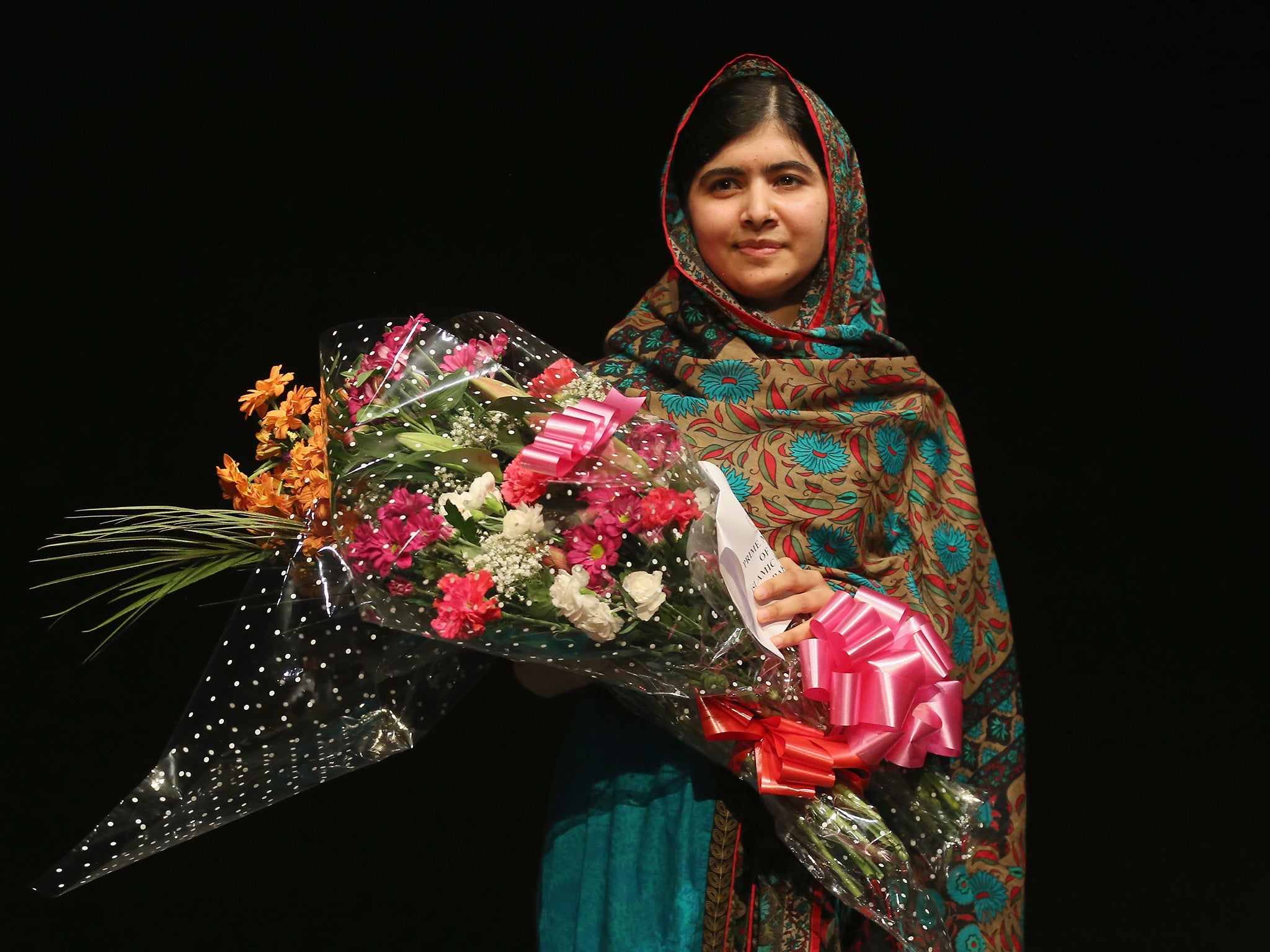Malala’s campaign to give all girls around the world 12 years of education inspires major breakthrough in India
The education minister of Maharashtra has publicly agreed to prioritise the schooling of girls in a revolutionary move

Three years after she was shot by Taliban militants, Malala Yousafzai’s campaign to ensure all girls receive at least 12 years of education has achieved its first major success.
The education minister of Maharashtra in India has publicly agreed to prioritise the schooling of girls in a revolutionary move after he was inspired by the 17-year-old Pakistani girl’s plight.
His promise could change the lives of 8 million girls in the state who are out of education – and possibly millions more across India.
Vinod Tawde made the speech via live video link from New Delhi, where he was with the Indian Prime Minister, Narendra Modi - who is due to visit Britain later this month.
The gala, in Mumbai, was attended by more than 1,000 girls from a range of backgrounds, including survivors of rape, orphans and children from the slum areas of Maharashtra.
“I will work to support girls’ education by all means,” Tawde said, emphasizing his appreciation of the Malala initiative, launched alongside her new documentary film, He Named Me Malala.
Only 48 per cent of girls in India attend secondary school – and, according to a study by Indian education foundation Praham, just 56 per cent of schools in India have useable girls’ toilets.
Statistics from Smile, an NGO focused on universal education for the underprivileged, indicate that as many as 53 per cent of girls between the age of five and nine in India are illiterate.
Girish Kulkarni, the founder of Snehalaya, an Indian women and girls’ NGO that hosted the gala, said he believed the ministers’ promise could change opportunities for millions of girls, not just in Maharashtra, but nationwide.
“Malala has become a global symbol,” he said. “Tawde assured us that he would work to keep more girls in schools. He is one of the key ministers, and he has the ability to make real progress that can be copied across the country.”
Kulkarni outlined a number of reasons why he believes so many girls drop out of school by the age of 13. As well as poverty, and religious parents being concerned about their children being drawn away from the faith by modern technology, he sited the tradition of young marriages in the country.
“They are worried about girls falling in love and running away from the family, which would bring them shame. There is also a tradition of early marriages in most of India. More than 35 per cent of girls under 16 are forced into marriages in India even today. There are also so many cases of rapes and gang rapes being reported, from girls of seven months to women of 87, that parents worry about their protection while they are at work. So they marry them young in order to have the protection of the husband and the in-laws.”
Parvati Pujari, touted by the national press as the Indian Malala, overcame her situation of poverty to become a youth ambassador with high profile NGO Magic Bus and advocate for girls’ education across the country
Speaking at the Gala For Malala in Mumbai, she said: “When a girl’s parents or the community or the role models create a platform and give her an opportunity, her voice can be heard.”
The Vice-Chancellor of Mumbai University, Sanjay Deshmukh, added: “I feel we should get together, by way of institutions, organisations, social workers, to send a message: appreciating the contributions of girls and women is the solution for providing wisdom to our global community.”
Malala has become a global symbol
Ramesh Kacholia, the founding member of Indian funding foundation Caring Friends, cited education as a necessary means to empowering women to be self dependent.
“Only 25 per cent of Indian women are working. If more were to get into work, the standard of living would go up substantially. This could give a tremendous boost to the economy.”
CEO of Snehalaya UK Miranda Hudson said that the charity now plans to take the Malala initiative, Students Stand with Malala, directly to girls in rural areas who can’t be mobilised. “That’s why our pitch for the Gala for Malala was called ‘Move Mountains’, if you can’t get a child to see the film because of poverty or religious sensitivities, then we’ll bring the message of the film and the education to her.
“I feel that the level of interest that Malala has brought to India has been for all of the right reasons. NGOs, students, and the Education Minister himself are all looking at what they can do to be advocates of girls’ education and give India back her voice. It’s no longer someone else’s problem.”
Snehalaya is also one of the nine Indian NGOs who have spearheaded the #HerVoice campaign, a month-long initiative calling on the Indian government to strengthen laws existing anti-rape laws and work to end violence against women and children.
More information on the campaign can be found at www.withhervoice.org.
Subscribe to Independent Premium to bookmark this article
Want to bookmark your favourite articles and stories to read or reference later? Start your Independent Premium subscription today.

Join our commenting forum
Join thought-provoking conversations, follow other Independent readers and see their replies